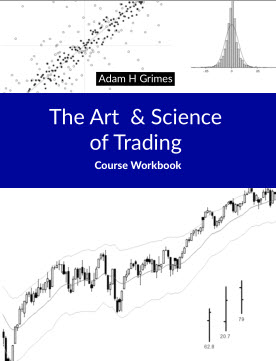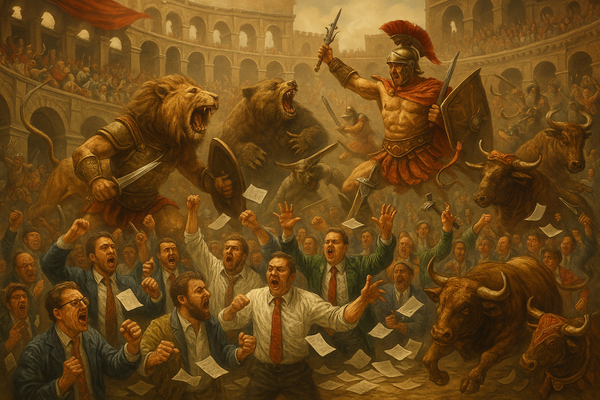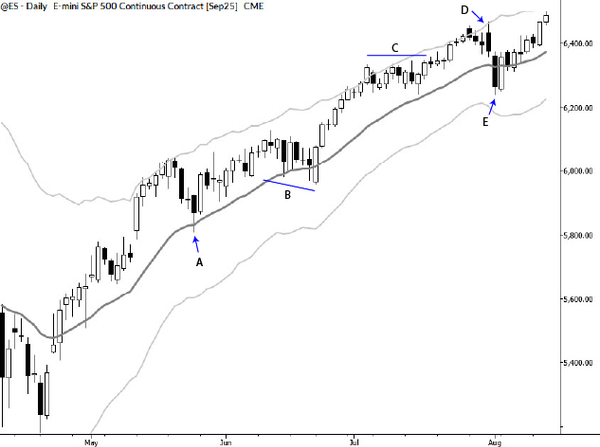A new book, The Art & Science of Trading

I wanted to share a bit with you about the new book I have written: The Art and Science of Trading: Course Workbook, which is available here on Amazon.
A few words on the content and ideas behind the book.
Many of you know my trading course, which was first published in 2013 and included about 30 hours of video and hundreds of pages of pdf exercises. I was learning how to create that kind of content as I went along, and even the outline of the course required significant revisions. Since the course was first put up, thousands of traders have been through it, and I’ve gotten some incredible feedback—many traders telling me that this was the thing that bridged to gap to profitability for them.
With the launch of MarketLife, I decided to completely update and revise the course. In the process of doing that, I created new exercises with pdfs of a higher production quality… and I realized I had the seed of a book. This material is Part 1 of the book—about 300 pages of exercises, covering everything from chart reading to belief inventories to creating your own trading plan. There are many examples of historical charts, including the full history of the Dow Jones average, and selected major events (e.g., the 1987 crash, Eisenhower’s heart attack, the breakout of both World Wars) for you to analyze in the context of the patterns and tools you learn in the course.
I also have included a large number of edited blog posts in this first part. I was a bit hesitant to do so because I’ve read books that are just blog posts slapped between two covers, and, frankly, I’ve been irritated. (I even took the step of returning one of those books to the publisher a few years ago… something I never do.) However, this is different: doing this allowed me to take 5+ years of my writing on various topics and focus them with pinpoint accuracy on the topics and issues you’re exploring in the other work. I think this is a valuable expansion and contribution, even if you read the posts when they were written (which I hope you did.)
The second part of the book is mostly material that did not make it into my first book, The Art and Science of Technical Analysis. Again, I’ve touched on some of this in various presentations and blog posts, but the value of the work is in seeing how to ask questions and get answers. I use topics such as moving averages, Fib ratios, the opening range tendency, and show a scientifically minded approach to understanding the market’s movements. There is significant material here that has never appeared in print.
The last chapter of the book focuses on quantitative evidence that supports my style of trading, and all the patterns in the course. We discuss tendencies between different asset classes, and how to structure these ideas into actual trades. Most of you know I'm always talking about how random markets are; well, here are some ways they are NOT random!
You might ask why I didn’t publish this material years ago. The reason is two-fold: many of the editors and early readers of my first book thought this material was too controversial. I was told things like “just support other analysis. Too many people talk about moving averages for you to show there’s no statistical edge. Everyone uses them…” I think this advice was wrong, and I'm happy to share this material with you today. The second reason was more important: if all of this material had been in my first book, it would have significantly shifted the focus of that first book--making it less practice and perhaps too distracted by details of statistical techniques. Good writing is mostly good editing, and good editing meant this material didn't belong in the first book... but it works perfectly here!
I’m very excited about this book and to be able to share it with you. For now, if you haven’t already seen my new site, go check out MarketLifeTrading.com. The new version of the course is in progress there—it still is, and will always be, completely free. We also have several video series relating to current market conditions, screens and setups in stocks, and a growing community forum. Come and join us!
Here’s a table of contents of the book:
The Art and Science of Trading: Course Workbook (2017)
Adam H Grimes
Part 1:
Chapter 1: Module 1–Chartreading 101
Chapter 2: Module 2–Chartreading, Going Deeper
Chapter 3: Module 3–Market Structure & Price Action
Chapter 4: Module 4–The Pullback
Chapter 5: Module 5–The Anti
Chapter 6: Module 6–The Failure Test
Chapter 7: Module 7–Breakouts
Chapter 8: Module 8–Pattern Failures
Chapter 9: Module 9: Practical Trading Psychology
Part 2
Chapter 10: Academic Theories of Market Behavior
Chapter 11: Tools for Quantitative Analysis of Market Data
Chapter 12: Universe & Methodology
Chapter 13: Fibonacci Retracements
Chapter 14: Moving Averages
Chapter 15: The Opening Range Phenomenon
Chapter 16: Quantitative Evidence of the Two Forces
Bibliography
About the Author
Index



